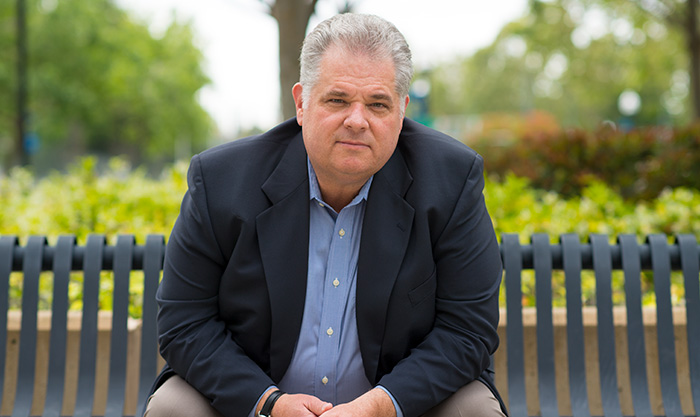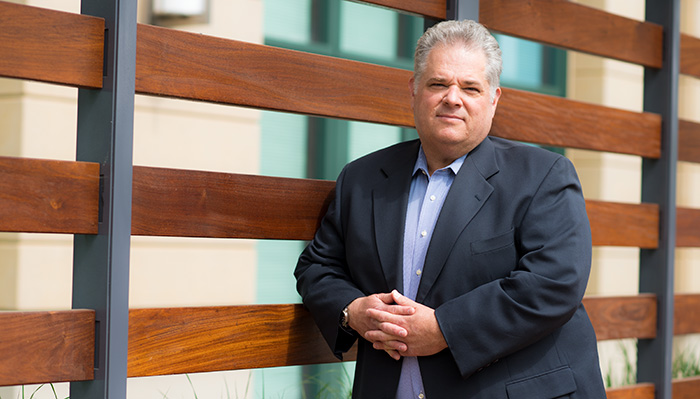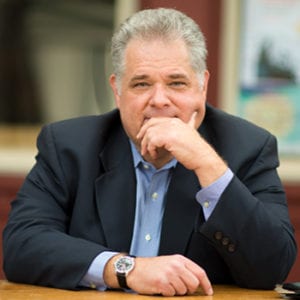Working to positively impact clients’ lives
Working to positively impact clients’ lives

Jack Dominge, CFS • Sunnyvale, CA
Uptrex Wealth Advisors • SCF Securities, Inc.
Read full biography below
Proactive Advisor Magazine: Jack, what motivated you to become a financial advisor?
I grew up in a family of educators in the San Francisco area, so I always thought I would be a secondary school teacher or a professor. I majored in psychology in college, with a minor in business. After school, I told my father that I just did not think education was the right career for me, and I saw opportunity in the growing technology industry in northern California. I worked as both a high-level recruiter and project manager in the tech field, and achieved significant financial success doing so. I was accumulating assets and doing some investing for my own account.
My father passed away a few years later, and that had a major impact on my life and thinking. He had always found great satisfaction in his career, and I was not. I also saw my mother, a highly educated and successful woman, struggle to make the right financial decisions after my father’s death. She knew little about financial planning and was intimidated by the financial industry.
This was a major decision point for me. I had always been interested in the financial markets, so I decided to interview with several well-known financial firms. The firm I chose had a tremendous training program, which included both mentoring in the field and classroom work. The educational component of the program was over two years long, and we had intensive sections on areas such as financial planning, investment management, insurance and annuities, and retirement planning. While building an income stream as an advisor was a slow process, I saw an upward trend each year and hung in, determined to make it a successful career move. It paid off in the end, and I am happy I made that decision. I give a lot of credit to my wife, who has always encouraged me to pursue my goals.

How do you describe your practice and clients today?
One of my guiding principles evolved from dealing with my father’s death and my mother’s situation afterward. She found financial decision-making stressful, simply because she did not have anyone to guide her. That situation showed me that even good, hard-working, educated people may be a little lost when it comes to their finances. A big part of what I want to achieve with clients is to help them comfortably manage what might seem intimidating or overwhelming.
That does not mean it is always going to be easy. I am a firm believer in helping clients build financial and retirement plans based on achievable assumptions, and that can involve an injection of tough, reality-based thinking. Education is a big component of what I try to achieve with clients. I want to help people from all walks of life, whether they are middle-income earners, millionaire-next-door types, or higher-net-worth small-business owners. Most of my clients are just quiet, everyday people who live within their means and whose family and career are important to them. They have usually achieved some success in their chosen field and are open to the idea that working with a financial professional can be advantageous for their finances.
“We want to ensure that we have appropriate defensive risk measures in place for all client portfolios”
I would call our practice a “boutique” wealth-management and retirement-planning firm. We are small by design. We work with clients we think we can positively impact in a significant way. We take a “defense first” approach regarding planning and investments. We concentrate on trying to hit lots of singles and doubles and avoid strikeouts. In short, our aim is to minimize the emotional highs and lows of the financial markets and let clients enjoy their lives while we worry about their money. No show or flash—just quiet and, we think, effective long-term wealth management.
Describe your approach to money management and your investment philosophy.
 I have been in the advisory business since 2001. We have obviously seen two major market displacements since that time. My initial training was in modern portfolio management and classic principles of asset allocation, but clearly that has not worked well in times of market stress.
I have been in the advisory business since 2001. We have obviously seen two major market displacements since that time. My initial training was in modern portfolio management and classic principles of asset allocation, but clearly that has not worked well in times of market stress.
While my clients pulled through these periods by and large intact, it was not a pleasant experience. It took several years of portfolio recovery for those who were willing to stay the course. Fortunately, while it took many meetings and phone calls, almost all my clients did manage to weather the storms. I have since moved to an investment philosophy of defense first. I tell clients that we are not looking to ride markets all the way to the top, but we are also certainly not going to ride them all the way to the bottom. I say that we are attempting to benefit from the 75% of the market in between the extremes.
I think this approach benefits clients in pragmatic investment terms and is also a psychologically more attractive approach, trying to lessen the emotional stress associated with market volatility. I try to help people set realistic return expectations, manage their emotions when it comes to the markets, and understand what we have seen historically in terms of market cycles.
How do we do this from a strategy perspective? Speaking generally, I use a blend of active and passive strategies. I employ the services of highly sophisticated outside money managers. Both managers use quantitative methodologies that help take emotion out of the investing equation. As a student of behavioral finance, I know how important that can be when discussing strategies and investment performance with clients.
But these two asset managers have different approaches. One employs a long-only quantitative approach to investment selections. The other offers many tactical strategies, including trend-following, sector rotation, and leveraged and inverse strategies. My role is to manage the managers, performing due diligence on their strategies, and help clients formulate the asset and strategy allocation and diversified approach that is most suitable for their objectives.
We believe an overall financial and investment planning strategy comes first, well before the investment implementation phase. What is important in the long run for a client or client family? What are they trying to accomplish? What legacy are they interested in passing to family, church, or charities? Once those broad objectives are agreed upon, we can move into the investment strategy phase. We want to ensure that we have appropriate defensive risk measures in place for all client portfolios, and then we can focus on growing client wealth. Active investment management, and the expertise of our outside money managers, plays a critical role in both our defensive and offensive investment planning. We want to build client portfolios that can perform in all types of market environments, and that is where active management can shine.

What are the important principles of your firm that you communicate to clients and prospects?
We have spent a lot of time working on this, and our new website clearly communicates what we believe in. We have cited seven reasons why we think our practice is different, which we share in early meetings with clients.
- Clients know what we believe in at all times. As an independent firm, we’ve been able to create the kind of company that we would want to work with ourselves. Our mission statement is based on our belief that everyone deserves financial security. Clients need to protect what they have first—growing wealth comes next.
- We are guided by what’s best for the client. As an independent firm, we are not influenced by sales targets. We answer only to our clients.
- We often invest our own money alongside our clients. We perform due diligence on investment firms that provide sophisticated strategies that we use ourselves. We also employ a “defense first” approach for our personal investments.
- Our service truly is personal. At a large firm, an account may be one of hundreds managed by a single advisor. We have committed to working with a limited number of clients, so we can give them the time and attention they deserve.
- Our role is to provide education, guidance, and recommendations based on an overall financial and investment plan. That involves consideration of a client or client family’s lifestyle needs and circumstances, time horizon, risk profile, and goals and objectives. Clients must feel empowered to take an active role in the decision-making. We try to make this easier by communicating in clear terms, not financial jargon.
- Having a good fit between advisory firm and client is extremely important. The initial getting-acquainted stage and discovery is not something to rush through. Our goal is to work with clients who want to establish a long-term relationship.
- We believe clients will benefit from our investment philosophy over the long term. We focus on investment principles that we can control, as exhibited in our approach to asset allocation, diversification, and risk management. Our goal is not to beat the markets, but to help clients benefit from them.
 Jack Dominge is the managing partner of Uptrex Wealth Advisors, based in Sunnyvale, California. Uptrex Wealth Management offers clients financial planning, retirement-income planning, wealth management, and a variety of other financial products and services.
Jack Dominge is the managing partner of Uptrex Wealth Advisors, based in Sunnyvale, California. Uptrex Wealth Management offers clients financial planning, retirement-income planning, wealth management, and a variety of other financial products and services.
A native of the San Francisco area, Mr. Dominge says his family background, which includes parents who were both educators, inspired “a love of lifelong learning and inquiry.” He graduated from San Jose State University, where he majored in psychology and minored in business. He has since earned the Certified Fund Specialist (CFS) designation.
Mr. Dominge entered the technology industry after college, working first as a contract recruiter for engineers and managers, and then became a project manager working in the same field. In 2001, he decided to pursue a career in financial services and joined a national advisory firm, where he says he received “outstanding training and career coaching.” After more than a decade of successfully building his practice, he founded Uptrex Wealth Management in 2014.
Mr. Dominge and his wife have two daughters. He is involved with charitable and civic organizations in his community and enjoys coaching youth sports. He and his family travel throughout the U.S. and abroad. Mr. Dominge says he is “passionate about reading and fine food of many different cuisines.”
Disclosure: Securities offered through SCF Securities, Inc. Member FINRA / SIPC. Investment advisory services offered through SCF Investment Advisors, Inc. 155 E. Shaw Ave. Suite 102, Fresno, California 93710. Uptrex LLC and SCF Securities, Inc., are independently owned and operated. The opinions voiced in this material are for general information only and are not intended to provide specific advice or recommendations for any individual. To determine what is appropriate for you, please consult a qualified professional. All investing involves risk, including the possible loss of principal, and no strategy assures success or protects against loss.
Photography by Brian Byllesby

